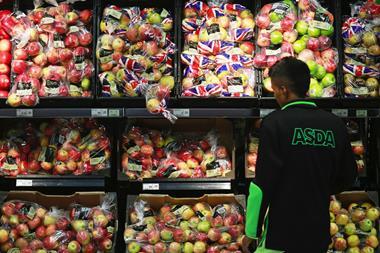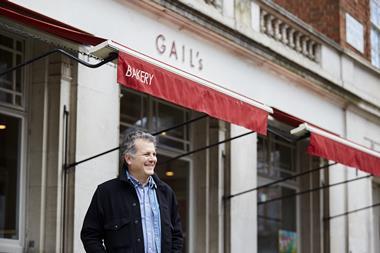The founders of Freja want to deliver the killer blow to stock cubes – by establishing their brand as front of mind in the ‘not full of shit’ world of bone broth
For such a chipper pair of interviewees, Freja bone broth founders Jess Leather and Ed Armitage have a ruthless streak. At least when it comes to describing their biggest innovation to date: instant bone broth sachets. They’re known internally as “the stock cube killer”, Leather reveals.
“Stock cubes is a dying category,” Armitage chips in. “There’s been no real innovation since the stock pot in the 90s, so if it’s a stock cube killer, it’s because the stock cube deserves to be killed.”
The instant broths, which took two years to develop, certainly beat stock cubes on the nutrition front. They’re high in protein, collagen and other nutrients, and low on unrecognisable ingredients. Essentially, they’re not “full of shit” like regular stock cubes, Leather says.
“When people read the ingredients panel on their stock cubes, they’re absolutely shocked,” adds Armitage. “Modified potato starch, maltodextrin, palm oil, maybe 1% chicken fat. Even the organic stock cubes are organic UPFs, so I always think that’s a bit of a con.”
The business is certainly in the right place at the right time with the UPF debate. It’s something the pair couldn’t have known when they started the business in lockdown, using money earmarked for a house deposit.

Starting out with ambient cartons of bone broth, they have recently gained confidence to roll out more lines, including a range of powdered shakes in July and the aforementioned instant bone broth sachets in October.
Granted, Freja doesn’t come cheap. It’s original bone broth cartons retail at about £7 for 500ml. “We recognise that price is an objection,” says Leather. “The liquid is our hero product, but not everyone’s got seven quid to bosh on some bone broth, so we wanted to revolutionise the stock cube [with the instant sachets] and do something at a more everyday price.”
Those come at an rsp of £5.99 for four 15g sachets, each of which makes 500ml of stock. It’s “still expensive”, Armitage acknowledges. However, with scale, the pair are confident they can lower the price in the short to medium term to “start meeting the same price points as stock pots”. Freja also gives away the recipe on its website and socials, so people can make it at home “more or less for free”.
Crucially, the pair are pushing bone broth as a health product rather than a simple alternative to regular stock – one of the reasons behind changing the brand name from Take Stock to Freja in June 2023.
“If you view it as a cooking stock, then it really is a luxury product that’s unaffordable,” says Armitage. “Is bone broth a trade-up from a stock cube? We don’t think it is. If you treat bone broth as a mass collagen, protein and amino acid supplement, the price point is not that different to many you might find.”

Names: Jess Leather and Ed Armitage
Born: Gloucestershire (JL); Saudi Arabia, but grew up in Battersea (EA)
Live: Together in Stroud
Age: 46 (JL) and 45 (EA)
Family: Four kids, two each from previous relationships
Potted CV: 15 years as an employment lawyer, then Freja (JL); self-taught techie, 20 years in e-commerce including Waterstones, a couple of CEO roles, then Freja (EA)
Business icon: Joanna Jensen of Childs Farm and Sally Preston of Kiddylicious (JL); the Innocent crew, they made something better at a higher price (EA)
Best advice received: Go with your gut (JL); hire more senior people than you think you’ll need (EA)
Business motto: Get shit done (both)
Item you couldn’t live without: Noise-cancelling headphones (both)
Favourite film: Dirty Dancing (JL); The Godfather (EA)
Favourite use for Freja: drinking the beef broth as a hot drink (JL); as the broth in a wonton soup (EA)
Retailer opportunities
As well as being a different product, he argues, bone broth is targeting a different customer. The pair are using that argument to dispel any remaining price concerns at the supermarkets.
“Currently, the clean label customer and functional food customer can go down the ambient aisle and get some wonderful beans, lovely olive oil, but when they want stock, they’re entirely excluded from shopping in that category,” he says.
“So the opportunity for the retail buyer isn’t just to get their existing fixture shoppers to trade up in price, it’s bringing an entirely new customer on to the aisle. And, coincidentally, they’re precisely the high-value shopper they want to attract.”
The argument seems to be working. Having gained listings at Booths and Ocado, Freja launched into Tesco in January. Leather says it’s going “really, really, really well”, with “the buyer even calling us a unicorn”.
Plus, she points out, those sales been achieved without any big bang media opportunities or secondary space. “It’s just the customer walking down the aisle and seeing Freja – the opportunity is so massive”.

Most recently, Freja launched into 275 Waitrose stores on Monday, while a third “major” grocer will follow suit in October. All of which makes Armitage comfortable describing the brand as “a juggernaut”.
Freja is “comfortably into eight figures now and showing no sign of stopping. Our growth rate ranges from 200%-300%,” he says.
The brand’s predicted turnover for 2024/25 is £10m-£11m. Even so, the business is not profitable on an annualised basis.
“Profitability is not our objective,” Armitage says. “There’s a window to own the bone broth category in the mind of the British consumer and that’s our objective. We’re sufficiently capitalised through fundraising. We’ve raised just over £5m to cover the losses we’re incurring, so we’ve got the cash to do it, and our objective is topline growth.”
“We recognise that price is an objection. Not everyone’s got seven quid to bosh on some bone broth, so we wanted to do something at a more everyday price”
Investors will no doubt be buoyed by the prospect of bone broth straddling two sizeable categories: food & beverages, plus vitamins, minerals & supplements. Consumers shop those categories in very different ways, says Armitage. About 80% of supplement sales are done online and 20% offline, he points out, while the reverse is true in food.
Those percentages mean Freja is particularly excited about the growth opportunity in the supermarkets. “As you grow and reach more people in a mass market scenario, you have to put it out as a food product, and that’s overwhelmingly in physical retail. So, if the first £10m of the business has been largely online, the next £20m will be predominantly offline,” Armitage says.
Those listings will be backed by ambitious marketing plans. The pair are planning to “throw a couple of million pounds” at Meta adverts alone this year.
“We’re the only brand spoending money to grow the category,” Armitage says. As such, the pair believe growth in bone broth is about 50% down to consumer trends and 50% down to their own efforts.
“Our thesis is, if we’re the first bone broth consumers hear about, we become synonymous with the category as well as the trusted brand. And that, combined with increasing stocking points, should do it. We don’t claim to be geniuses, we’re just following a playbook.”
Read more Big Interviews:
-
How Simon Duffy hopes to make Waken ‘the next Colgate’
-
Iceland Foods CEO Tarsem Dhaliwal on keeping it in the family
-
JW Filshill’s Simon Hannah on AI, tech and staff mental health
-
Tom Molnar’s simple mantra at Gail’s: doing bread better
Their confidence is also rooted in what they’ve seen in the US, where bone broth is a “fully developed category”, according to Leather. There, supermarkets have “walls and walls” of bone broth, with a range of brands, formats and price points – and that’s not to mention the “bone broth coffee shops” in New York. Leather estimates the UK is about eight years behind that curve.
“We’re really early in this story,” adds Armitage. In five years’ time, the pair envisages the brand doing “certainly more than £50m in turnover”.
“Bone broth sits across pretty much every single macro trend,” Leather adds. “There was a report done by Kerry Foods of what trends are here to stay, and they are gut health, food for your skin, collagen, protein, clean label – and bone broth meets all of them, apart from plant-based. But hey, you can’t have everything, right?”












![Finn apprentice 2[27]](https://dmrqkbkq8el9i.cloudfront.net/Pictures/380x253/3/4/2/356342_finnapprentice227_614677.jpg)







No comments yet